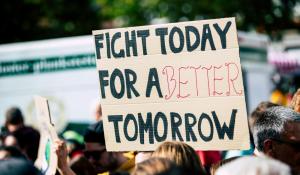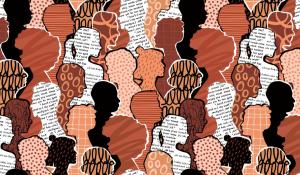
The raging fires in Los Angeles, made more likely and more uncontrollable by dry conditions exacerbated by climate change, destroyed the homes, communities, and livelihoods of tens of thousands of people. The impacts affected people of all races and incomes. Yet some Angelenos, including immigrants, were among the hardest hit.
Thousands of immigrants lost their housing, including in the diverse Altadena neighborhood. In addition to losing housing in the fire, many immigrants instantly lost employment. When wealthier homeowners lose their homes, housekeepers, landscapers, and nannies are suddenly unemployed, sometimes permanently. And business that largely employ immigrant cleaning staff may shutter offices that burned. While wealthier residents may be able to work from home while they are displaced, the burned out homes and offices were the only workplace for many immigrants.
The Latino Policy & Politics Institute estimates that at least 35,000 jobs held by Latinos were at risk of temporary or permanent displacement. Since many of the immigrants holding these jobs are undocumented, they won’t receive any government assistance. This is part of a larger pattern: government and private assistance generally benefits those who are already better off, while people with lower incomes often slide further into poverty after disasters. Research demonstrates that both GoFundMe campaigns and FEMA relief direct dollars to people who are wealthier and better connected, reinforcing and exacerbating income inequality rather than narrowing it.
In many ways, the L.A. fires shed a spotlight on an ongoing truth: climate change often impacts those who are in the most precarious position, and in the U.S., that includes immigrants. It’s not just headline-worthy climate disasters posing a threat. In their day jobs, immigrants are greatly impacted by rising temperatures and other consequences of the climate crisis.
That’s definitely the case in the fields and slaughterhouses creating the nation’s food supply. Immigrants are the backbone of U.S. agriculture, making up 73% of the agricultural workforce. Agricultural workers perform back-breaking work for an average of 46 hours per week with no overtime pay, often in sweltering temperatures, with few breaks. They are 35 times more likely to die from heat-related stress than workers in other occupations.
And when forest fires break out, it is immigrant workers that often suffer the most, since they often work outside in farming, landscaping, and construction jobs. Wildfires produce smoke laden with fine
particulate matter. Smoke inhalation can exacerbate existing health conditions and is linked to increases in heart attacks, stroke, and cancer.
The Trump Administration’s executive orders on climate change and immigration will make the
situation worse. Pulling out of the Paris Climate Accords, opening more federal lands to drilling, and increasing natural gas export terminals are just a few of the ways that the Administration will accelerate
climate emissions. And orders deploying the military to the border while attempting to end birthright
citizenship and engaging in raids on undocumented workers makes the situation of millions of immigrants more precarious. The more precarious their legal situation, the harder it is for immigrants to seek protection for themselves from climate impacts and other hazards on the job, since they risk deportation if their employers turn on them.
As green economy activists, our support for immigrants in L.A. and elsewhere who are unlikely to get government aid is vital. In the aftermath of the fires, there are many opportunities for us to take immediate action. For instance, Inclusive Action for the City launched a fund to support outdoor workers impacted by the fire. The Fund already has a wait list of 8,000 workers and needs donations so it can
provide $500 payments to workers in need. The National Domestic Workers Alliance has also set up a fund to support domestic workers harmed by the fires.
In the long run, we can urge local and state officials to protect immigrants in our communities. We can also support federal and state laws and rulemaking that provide protections for domestic, caregiving, agricultural, landscaping, and construction workers, while opposing the roll backs of existing protections in states like Texas and Florida.
Make no mistake, immigration and worker protections are green issues. All advocates for the
environment and climate need to stand up for the rights of people on the front lines of climate change, and who are essential to keeping our economy running, when they are under attack.







